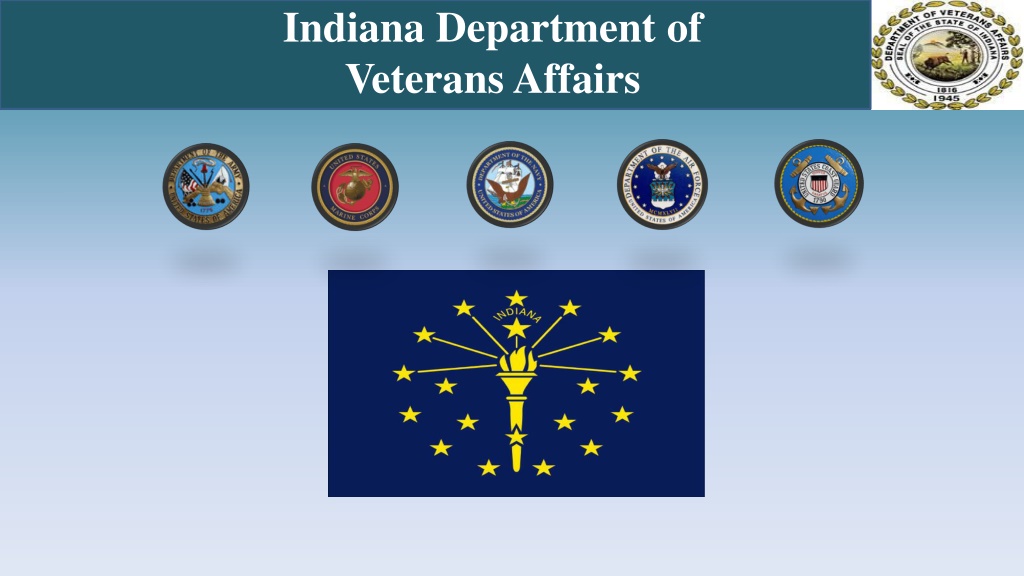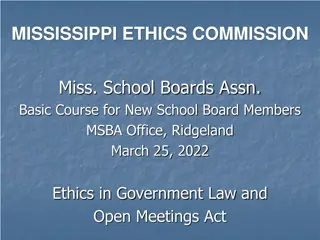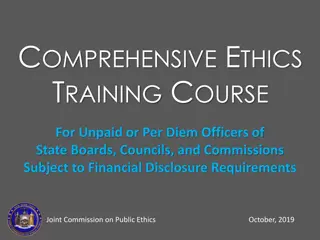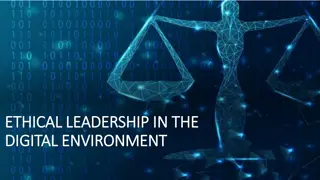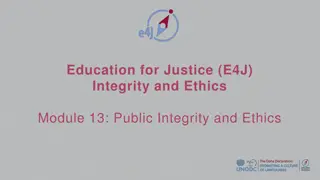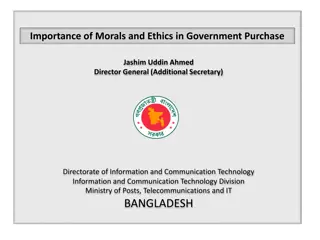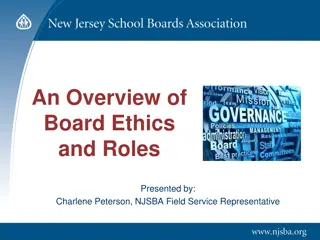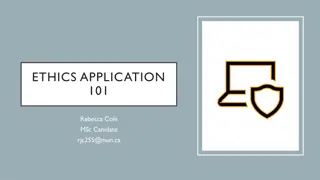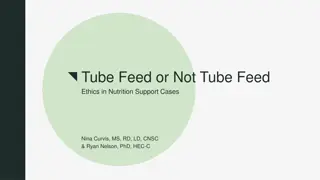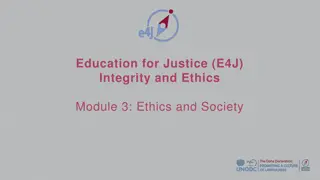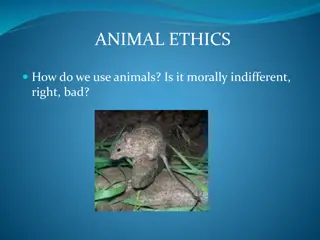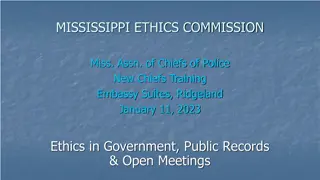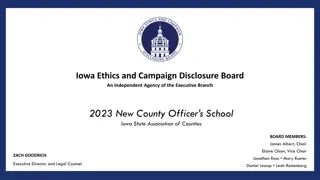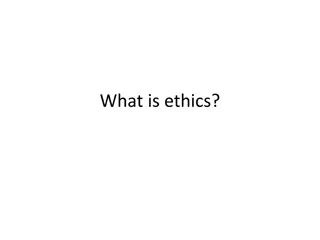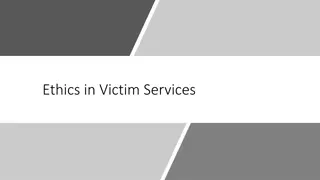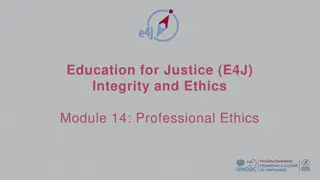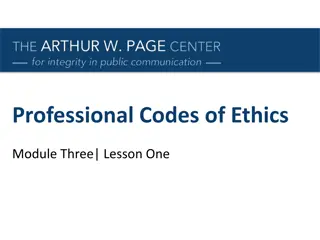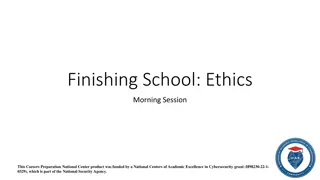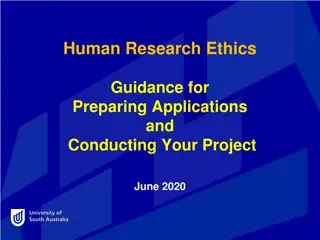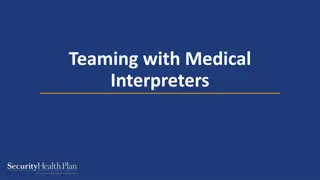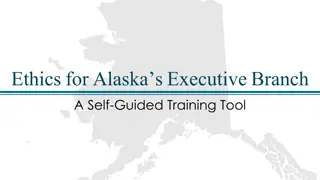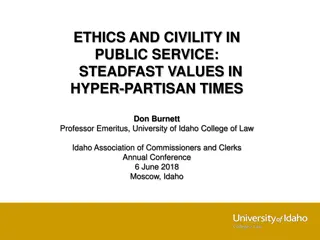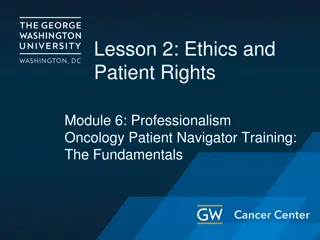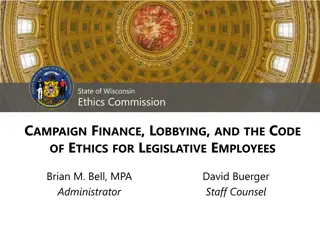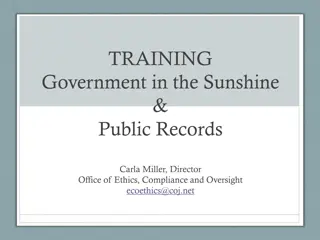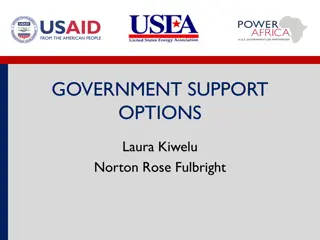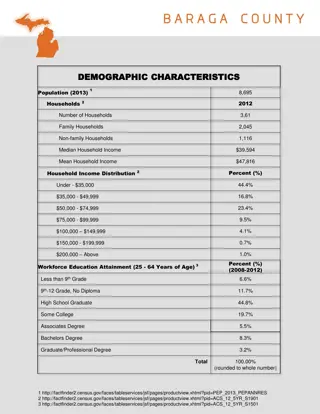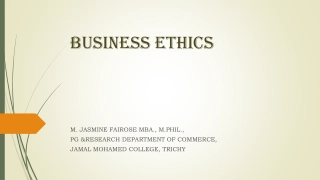Importance of Ethics Training in Government Organizations
Ethics training is essential in government agencies to ensure decisions are made in the public interest, free from influences like gifts or political contributions. It emphasizes the need for clear guidelines, annual training for employees, and understanding ethical codes to avoid violations that could lead to severe consequences. The training covers topics like gift rules and exceptions, emphasizing the importance of ethical conduct in maintaining trust and integrity within the organization.
Download Presentation

Please find below an Image/Link to download the presentation.
The content on the website is provided AS IS for your information and personal use only. It may not be sold, licensed, or shared on other websites without obtaining consent from the author. Download presentation by click this link. If you encounter any issues during the download, it is possible that the publisher has removed the file from their server.
E N D
Presentation Transcript
Indiana Department of Veterans Affairs
Indiana Department of Veterans Affairs Ethics Training
Ethics Training Why is Ethic Training Needed? Hoosiers deserve to know that government decisions are based on the public interest, not because of gifts, political contributions, or undue influence. It is imperative that clear guidelines be developed and enforced to ensure employees meet the highest standards of conduct.
Ethics Training All Veteran Service Officers and employees of that office should complete ethics training every year. This is many times not required this often, but in our line of work it is best to stay sharp and not become complacent in our daily activities.
Ethics Training Knowledge is power! You need not memorize every word in the Code of Ethics but being familiar with the rules will ensure you stay out of trouble. At the very least, you will know when you should ask for advice.
Ethics Training Violations of the Ethics Code can be costly. Your employment can be terminated, and you may be banned from any future employment. Refer to IC 4-2-6-12 for a full list. This presentation is based from the Indiana State Employee Ethics Training and the rules presented may or may not all apply to county offices. If you have questions you should consult your county officials for exact guidelines that pertain to your position as a county employee or appointee.
Ethics Training GIFTS Rules related to gifts and other forms of payments to employees (besides their salary) are intended to prevent influence on workers and their actions. Do not accept gifts from any person who has a business relationship with your office or agency. The term gift includes the following: money, item, favor, service, entertainment, food, drink, travel expenses, or registration fees.
Ethics Training GIFTS Are there any exceptions? Yes, 1. Gifts from public institutions 2. Food or Drink at certain public meetings with 25 or more people with an educational component. 3. Mementos or souvenirs of nominal value 4. Gifts from family members or friends IF these are not written off as a business expense. 5. Nominal refreshments. 6. Discounts/promotions offered to all employees of the government agency.
Ethics Training GIFTS What if I am offered something of value, such as a gift card because I gave a speech or presentation, or for doing my job duties? Are there other rules that apply? The short answer is Yes there are.
Ethics Training GIFTS Honoraria Honorarium means a payment of money for an appearance, speech, or article. You cannot personally accept an honorarium for any activity that may be considered part of your official duties. You may be allowed to accept an honorarium on behalf of the county or state so long as it is not from a person who has a business relationship with your agency and payment is turned over to the county or state treasurer. If unsure check with your county official or state treasurer s office before accepting.
Ethics Training GIFTS Compensation means any money, thing of value, or financial benefit conferred on or received by any person in return for services to be rendered. You are prohibited from accepting additional compensation (beyond your salary) for the performance of your official duties. .
Ethics Training GIFTS Discussion
Ethics Training Political Activity While employed as a CVSO you are not prohibited from participating in the political process, there are certain prohibitions related to campaign fund raising and when you can engage in political activity. For instance you may not engage in political activity when on the job or when acting in your official capacity. Additionally you may not use your official title if engaging in political activity on your own time.
Ethics Training Political Activity You may never (even off the job) seek political contributions from: 1. People who have a business relationship with your agency or 2. Employees you supervise In addition, you may never seek political contributions on behalf of others if you are: 1. An appointing authority; or 2. If you have purchasing authority. ** The rules differ for candidates. Consult your county attorney, Indiana Code, or policy for more information
Ethics Training Political Activity Discussion
Ethics Training Conflicts of Interests A conflict of interests is a situation in which an individual has competing interests or loyalties. Sometimes an employee can find themselves in a position to derive personal benefit from actions or decisions made in their official capacity.
Ethics Training Conflicts of Interests There are 3 rules concerning conflicts of interests 1. Outside Employment 2. Decisions and Votes 3. Contracts
Ethics Training Conflicts of Interests Outside Employment, also called moonlighting, means having additional employment outside your job. You could have a conflict of interest under this rule if your outside employment: 1. Conflicts with your job responsibilities 2. Requires you to reveal confidential state or county information; or 3. Involves using your position for personal gain.
Ethics Training Conflicts of Interests Decisions and Votes This rule prohibits you from participating in a decision or vote, and all matters relating to the decision or vote, in which you or certain other people might have a financial interest. This prohibition also applies if a business you serve, or a potential employer has a financial interest in the matter.
Ethics Training Conflicts of Interests Decisions and Votes If your position requires you to make decisions in matters in which you (or an immediate family member, or potential employer; or a business organization in which you are a member or hold a leadership position) have a financial interest in the outcome, you have a potential conflict of interest.
Ethics Training Conflicts of Interests Contracts If you have an outside position /business, you must ensure you do not have a financial interest in any contract with the state or county (State Employee vs County Employee). This may also be a criminal violation. Always seek advice if you think you may have a financial interest in a county or state contract.
Ethics Training Conflicts of Interests What should I do if I have identified a potential conflict of interests? 1. Notify your ethics officer and immediate supervisor and or agency head. 2. Refrain from any participation in the matter. (even discussion before an actual vote.
Ethics Training Conflicts of Interests Discussion
Ethics Training Ghost Employment This rule prohibits employees from engaging or directing others to engage in any work besides their official duties during work hours.
Ethics Training CONFIDENTIAL INFORMATION State and county service officers must not use OR disclose confidential information to which they have access by virtue of their position. Specifically, you are prohibited from: 1. Benefiting from or allowing any other person to benefit from confidential information; 2. Divulging confidential information; 3. Accepting compensation from any employment, transaction, or investment which was entered in to or made as a result of confidential information.
Ethics Training Confidentiality It is imperative to keep our veteran s information confidential. Some basic guidelines we all should follow are; Do not discuss or provide information about a veteran s claim or personal information with anyone not directly involved with the claim. Conduct interviews in private locations so as not to divulge personal information to those in the immediate area. Do not leave documents with personal protected information (PPI) unsecured. Do not leave VetraSpec screens open or accessible to unauthorized people. Do not share passwords/ PINs or any other logon information Keep offices, cabinets that contain PPI, and computer screens locked when not in use Secure your PIV card when not in use
Ethics Training Confidentiality Discussion
Ethics Training Use of Government Property Employees are prohibited from the personal (non-official) use of government property unless permitted by their agency s de Minimis (minimal use) policy.
Ethics Training Use of Government Property Discussion
Ethics Training Nepotism Employees cannot hire or be in the direct line of supervision of any of their relatives. Relatives include: 1. Parent 2. Sibling 3. Aunt /Uncle 4. Niece /Nephew 5. Spouse 6. Children (Stepchild / Grandchild / Stepgrandchild) 7. In-laws ( Son, Daughter, Mother or Father)
Ethics Training Nepotism Discussion
Ethics Training QUESTIONS??????
